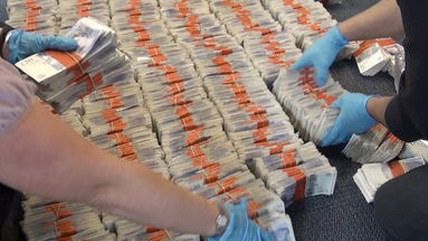Final Chapter of Cash Seizure Series a Repulsive Accounting of Police Misbehavior


On Monday I noted The Washington Post had put together a series of stories offering a deep look at the abuse by law enforcement agencies across the country of civil asset forfeiture laws and how they've been able to line their pockets with citizens' money without ever actually proving said citizens had committed any crime.
The final chapter is, as teased, a collection of terrible stories of American citizens who happen to be transporting cash being stopped by law enforcement officers for relatively minor reasons and conclude with these people having said cash taken away from them. Here's just one of several stories highlighted:
Matt Lee of Clare, Mich., got snared in an interdiction net in 2011 on Interstate 80 in Humboldt County, Nev. Lee was a 31-year-old college graduate who had struggled to find work and had moved back in with his parents to save money. When a friend promised him an entry-level job as a sales rep at a photo studio in California, Lee's father, a postal employee, loaned him $2,500 in cash and Lee drove west in a decade-old Pontiac Bonneville.
On his third day, Lee was passing through the Nevada desert, wearing aviator sunglasses. A sheriff's deputy raced up alongside the Bonneville, stared at Lee and then pulled him over.
Humboldt County Sheriff's Deputy L.A. Dove, a member of the K-9 drug interdiction unit, has received instruction from the 4:20 Group, a contractor for the DEA and one of the leading interdiction trainers in the country.
Dove asked whether Lee was carrying any currency and summoned a K-9 officer. Dove told Lee, who is white, to get out of the car and stand at the edge of the desert, while a dog sniffed for drugs. The deputy told Lee that he didn't believe his story that he was moving to California, because he was carrying so little baggage, Lee told The Post. Lee has no criminal record.
When a search turned up Lee's remaining $2,400 in cash, Dove and his colleague exchanged high-fives, Lee said. Dove said he was taking the money under state law because he was convinced that Lee was involved in a drug run. Lee was left with only the $151 in his pocket.
Lee got an attorney and eventually they agreed to give him his money back. But his attorney ended up taking half in fees.
For other cases, when challenged, officials offer to give the citizen half the money they've taken back if their victim will shut up and go away. Another victim, despite winning his battle and getting all his money back (and forcing the government to pay his legal fees) still ended up screwed over. The seized cash was to be used for costs of operating his small Virginia restaurant. Without the money, he ended up having to shut it down during the course of fighting for his property back.
Read the full story here. That at least nobody got beaten or shot is about the best you can say about the tales.


Show Comments (15)